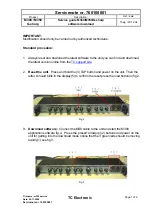
238
G
LOSSARY
POST
Power On Self Test. An internal test that a Switch carries out when it is
powered-up.
protocol
A set of rules for communication between devices on a network. The
rules dictate format, timing, sequencing and error control.
repeater
A simple device that regenerates LAN traffic so that the transmission
distance of that signal can be extended. Repeaters are used to connect
two LANs of the same network type.
resilient link
A pair of ports that can be configured so that one takes over data
transmission should the other fail. See also
main port
and
standby port
.
RMON
IETF Remote Monitoring MIB. A MIB that allows you to remotely
monitor LANs by addressing up to nine different groups of information.
router
A device that provides WAN links between geographically separate
networks.
roving analysis
A system that allows you to copy the traffic from one port on a Switch
to another port on the Switch. Roving analysis is used when you want
to monitor the physical characteristics of a LAN segment without
changing the characteristics by attaching a monitoring device.
RPS
Redundant Power System. A device that provides a backup source of
power when connected to a Switch.
segment
A section of a LAN that is connected to the rest of the network using a
switch or bridge.
server
A computer in a network that is shared by multiple endstations. Servers
provide endstations with access to shared network services such as
computer files and printer queues.
SLIP
Serial Line Internet Protocol. A protocol that allows IP to run over a
serial line (console port) connection.
SNMP
Simple Network Management Protocol. The current IETF standard
protocol for managing devices on an TCP/IP network.
Spanning Tree
Protocol (STP)
A bridge-based system for providing fault tolerance on networks. STP
works by allowing you to implement parallel paths for network traffic,
and ensure that redundant paths are disabled when the main paths are
operational and enabled if the main paths fail.
Summary of Contents for SuperStack II
Page 12: ......
Page 18: ......
Page 42: ......
Page 154: ...154 CHAPTER 4 WORKING WITH THE COMMAND LINE INTERFACE ...
Page 156: ......
Page 162: ...162 CHAPTER 5 PORT TRUNKS ...
Page 169: ...VLANs and Your Switch 169 Figure 32 Forwarding unknown 802 1Q tags ...
Page 173: ...VLAN Configuration for Beginners 173 Figure 34 Simple example Untagged connections using hubs ...
Page 180: ...180 CHAPTER 6 VIRTUAL LANS VLANS ...
Page 188: ...188 CHAPTER 7 FASTIP ...
Page 200: ...200 CHAPTER 9 SPANNING TREE PROTOCOL Figure 49 STP configurations ...
Page 210: ...210 CHAPTER 10 RMON ...
Page 211: ...IV PROBLEM SOLVING Chapter 11 Problem Solving ...
Page 212: ......
Page 224: ...224 CHAPTER 11 PROBLEM SOLVING ...
Page 226: ......










































